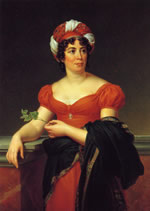
Wednesday 13th January, Fresh snow in the night and snow falling all morning, but the air is warmer and the snow is melting now, twilight gathering, the skies still low and unbroken grey. Finally, the winter holiday reading feature.
 Corinne, or Italy, May 1807, Madame De Stael.
Corinne, or Italy, May 1807, Madame De Stael.
Anne-Louise-Germaine Necker, daughter of Jacques Necker, Louis XVI's Finance Minister, the man who (amazingly) became the hero of the first phase, the hopeful bit, of the French Revolution. Madame De Stael (she married the Swedish Ambassador when she was twenty); "French Revolutionary Activist and Theorist of European Romanticism", "The most influential woman in Europe. . . the the
Spirit of Eighty Nine in person. How come I've never read anything by her before now, given my views and the fascination that period has for me? Because she was a woman? Guilty. I'm not immune, I'm afraid nobody is, to our immemorial cultural assumption that the men are more interesting, whatever the field of endeavour. Because, owing to her being a woman, "her fame has not survived"? I'm not so sure. How many of you out there are well up on her great rival, Francois Eugene Rene De Chateaubriand, the
other highly influential French writer and politico of those times? I think there was something else deeply wrong with Germaine De Stael, of which more later. . .
Over Christmas, and partly while felled by flu, I read a fragment called "Ten Years Of Exile", which is interesting but fragmentary, and her second novel
Corinne, Or Italy. I should now formally warn against spoilers (stupid concept, really). You're duly warned. Corinne is the story of a young Scottish, or English, De Stael thinks the terms are interchangeable, nobleman called Oswald (a name that sounded different at the time, I can only think
cf Harold), who takes a trip to Italy to nurse his great grief after the death of his father. He's the strong, sensitive, vulnerable yet hunky type, given to modest heroism between bouts of spitting blood. He encounters Corinne, on a day when she's being crowned for her poetry, in a kind of Ancient Roman Triumph. He's deeply smitten with this beautiful, talented, independent woman, who is a public figure, just about as famous as God, though never in an an arrogant way. He follows her to Rome and they begin an intense courtship, based on sight-seeing trips. Corinne shows Oswald Italy, and at the same time shows him herself. At least one of their sightseeing trips breaks the bounds of even free and easy Italian convention, but Corinne doesn't care, as she's convinced that though he hasn't declared himself, Oswald must intend to marry her. Finally, he explains that if he marries her, and he might not, she's going to have to give up her public life. He loves her talents, but as her husband he'd expect them to be reserved exclusively for his private consumption. They have a big emotional scene, Oswald returns to England. He's meant to be making up his mind who he'll choose, between Corinne and the modest, insipid young girl his dead father had picked out for him. Instead he meets the girl, who is actually Corinne's half-sister, and falls for her. Corinne finds out, is devastated, and does the noble thing. Oswald finds out, too late, that Corinne had found out, is devastated, realises Corinne is really the love of his life. . . Young girl finds out she's usurped her sister, is devastated... Etc, etc, repeat until at least one of the principals succumbs to early tragic demise.
I'm sure you recognise the formula, because it's still going strong, and the first English versions are still widely read: Mr Rochester, Heathcliff were only a couple of decades in the future. The Moody Romantic Hero, the Passionate Woman who is a match for him, optional Suitable Girl in a supporting role; plus the vital armchair tourism element. What makes
Corinne different (viewed just as Napoleonic chic-lit) is that she's interrogating the hide off that Romantic Hero, as popular then as now, and his moods, and his egotistical vaccillation between lovers, and his tormented soul. De Stael sets Oswald up as the acme of "sensitive" masculine cool, and then shows how he thinks only of himself, and destroys the lives of any poor woman who loves him. This is an interesting concept to start with. Plus, the armchair tourism is exceptional. De Stael knows a huge amount about Ancient and Modern Italian sites, history, customs, landscapes. She's also done all the travel, and uses her own experiences with skill and relish. This book would make you want to take ship at once for that vanished Italy, preferably crossing the perilous passes of the Alps at night, and in a snowstorm. Note the fever-haunted desolation of the Campagna, where nothing grows and you risk your life in spending a night there. Nobody gets bitten by insects in the marshy wilderness, but that's probably good-taste censorship. Nothing too disgusting is recounted about bedbugs, fleas or awful latrines in inns of passage either.
The actual fiction element is the weakest feature, as De Stael is an eighteenth century writer who tends to speeches rather than dialogue, and set pieces rather than narrative drive. Famously, she dismissed Jane Austen, on the other side of the divide, as "vulgar". The political element, surprising in a romantic novel, is unmistakeable. Corinne is the Anti-Napoleon. She's the Queen of Peace, Mistress of the feminine-coded arts. Champion of liberty, equality,
amitié, (thanks to greywyvern, you are right I was just being lazy); plus another one, which Mme De Stael has just invented,
diversity. In real life, at the time when this book came out, "Italy" was just a bundle of political interests, arranged around some battlefields where Napoleon had recently triumphed. De Stael invents a nation, and presents her concept of self-determined nationhood in opposition to the monolithic, police state European Empire Napoleon had just invented, thus cruelly betraying all his intellectual and artist admirers, not to mention the people, and the Revolution.
The sad thing is, they say (her biographers say) that she thought Napoleon would admire her new book, even that he'd see the lesson in it, and be grateful. Writers get the strangest ideas, especially if their position is oppositional, and they're so used to robust criticism they assume their opponents must be cool about it too. Big mistake when you're dealing with a vain, ruthless self-made Emperor who doesn't like women to have an intellect anyway. The novel was a huge success with the public, Napoleon was furious, and set out to destroy De Stael.
More later. I'm going to have to stop. Ginger has a new trick. When she is really not going to be ignored anymore, she gets behind my keyboard, puts her nose under it, and tries to shove it off the desk. Makes me laugh so much, she almost scuu ddde
 Monday February 22nd, February fill-dyke. It's still winter further north, here it's just rain, a raw fresh air, huge puddles when I sneaked out between downpours.
Monday February 22nd, February fill-dyke. It's still winter further north, here it's just rain, a raw fresh air, huge puddles when I sneaked out between downpours. 


 Tuesday 2nd February, still raining. Candlemas did not dawn bright and clear.
Tuesday 2nd February, still raining. Candlemas did not dawn bright and clear.  Monday 1st February, bright clear day, fading now: hard frost, dead calm
Monday 1st February, bright clear day, fading now: hard frost, dead calm
 Corinne, or Italy, May 1807, Madame De Stael.
Corinne, or Italy, May 1807, Madame De Stael.

